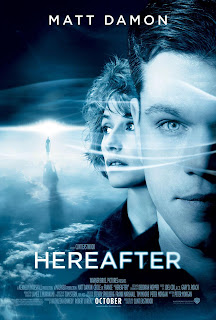Eastwood's "Hereafter" has challenging ideas but little impact
Hereafter (2010)
129 min., rated PG-13.
Grade: B -
Clint Eastwood as a director and an octogenarian never repeats himself, although all of his films are character-driven, and that goes for the relentlessly solemn "Hereafter." It's a more pensive and spiritual if less silly "Final Destination," but that sounds like a backhanded compliment. The film gets off to a spectacular, intensely visceral bang right out of a special-effects disaster movie like, say, "The Day After Tomorrow," as a titanic tsunami pummels an Indonesian beach town, drowning thousands of its people and everything else in its path. Marie (Cécile De France), a rich, famous French TV journalist and host, is one of the survivors, and the film focuses on her before, during, and after this near-death experience. Why don't we follow one of the Indonesians instead?
Matt Damon plays it close to the vest compared to the Jason Bourne movies but he's terrific as George Lonegan, a lonely San Francisco man working at a factory and living with a psychic gift that he considers a curse. He's tired of his younger brother (Jay Mohr) making him appointments with those that have lost and want to come in contact with loved ones. He meets a young woman (the striking Bryce Dallas Howard who's wonderfully wrenching in her short screen time) in a cooking class when partnered up, but their “cooking” relationship might be cut short when she learns of his powers and she suffers from her own personal loss. (Their blindfold taste testing scene has a sensual charge.) Meanwhile, in London, a pair of young twin brothers, Marcus and Jason (both played by George and Frankie McLaren at either time), try to hold their family together as their mother is a mostly absent alcoholic, until Jason (the eldest by 12 minutes) dies and struggling to navigate in the world full of frauds, Marcus desperately tries to contact his other half.
These three disparate stories will eventually be intertwined somehow in "Babel"/"Crash" fashion. Eastwood's overreaches his hand with his intriguing, challenging goals when it comes to the disappointing conclusion—a clunky Classic Hollywood ending with Eastwood's saccharine musical score—that feels like a lot of effort for little payoff. Still, the performances are vivid and the unurgent pacing takes its time in letting us get to know these characters. Eastwood and his editors structure the film in a logical, consistent manner, from each tale to the next, and use interesting locations.
The stories are compelling, with the twins' the most moving and holding the only complete catharsis of the three. And even if they all favor coincidence by a contrived design, Peter Morgan's script thoughtfully explores and questions life continuing after death in the hereafter and it's a bold move to not give us clear-cut answers. So it's not a total loss. "Hereafter" is rarely preachy but still, its lack of overall impact leaves one cold thereafter.









Comments
Post a Comment